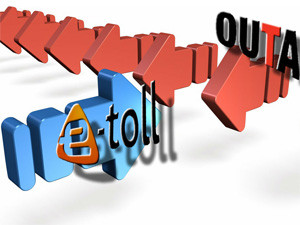
The SA National Roads Agency (Sanral) has reduced the monthly cap on light motor vehicles by R100 in its latest Gauteng Freeway Improvement Project (GFIP) regulations, but this has done little to placate anti-e-toll factions.
The wheels of government's e-toll system are in motion, with its implementation "imminent" according to Sanral, which yesterday said it was carrying out the final steps before e-tolling begins. This is despite widespread criticism and opposition to the system, which many see as an unnecessary and impractical funding method - positioning the fuel levy as a better alternative.
Sanral maintains the "user pay" principle is the only valid means of collecting the billions needed to fund the GFIP and maintenance of SA's roads. Sanral reiterated last week that it had issued bonds to fund the project of R20 billion plus capitalised interest amounting to approximately R3.4 billion that needs to be paid from the toll revenue.
E-toll antics
The Opposition to Urban Tolling Alliance (Outa) has condemned Sanral's release of the new tariffs and regulations - which it says are "virtually unchanged" - and says the reduction in the monthly cap (from R550 to R450) amounts to mere antics amid government's disregard for its citizens' sentiment.
"The latest array of regulations was released on Friday, once again without any public notification or announcement to the general public. On such an emotive matter, one would think their Web site would have clear links on their home page and advertisements in the press, inviting the public to comment on these proposed tariffs and regulations."
Outa chairperson Wayne Duvenage says e-toll opponents are, however, not surprised by the latest move. "We have come to expect this lack of open communication and transparency from Sanral, a state-owned enterprise that has ignored the input, insights and will of the people for too long."
Duvenage says Sanral will probably sell the latest tariff reduction as "a massive gain for society in an attempt to win the hearts and minds of a public that is now much wiser to their antics than Sanral gives them credit for".
Sanral recently indicated that 96.3% of users will pay under R300 - a statement Duvenage says is an attempt to lure the road-users into "getting tagged".
He says Sanral's use of averages is misleading, as the amount due by thousands of regular commuters from Tshwane to Johannesburg or from West to East will be well over R300 per month. "If this high percentage of users will pay less than R300, why not then lower the maximum to R300? Clearly Sanral expects a significant portion of their revenue to come from those users who exceed the R300 threshold and hence the modest decrease to only R450."
Outa has called for Sanral and the Department of Transport (DOT) to provide feedback from the last round of public engagement sessions held in November last year, and for authorities to host another round of public discussions to review the latest regulations.
"Despite the clear rejection by virtually all sectors of society, the government continues to forge ahead to ram this ill-conceived plan into being, backed by an illogical argument of a 'selective' user pays model. What they blindly ignore is the fact that Gauteng road users are angry about being charged twice for their roads (fuel levies and general taxes, plus tolls) and are further punished by paying VAT on the toll charges," says Duvenage.
Sanral spokesperson Vusi Mona says the perception that Sanral is against the fuel levy is misplaced. "The fuel levy is an important revenue source for the fiscus. All we have warned against is that it is insufficient to look after the entire road infrastructure."
Funding fight
While Sanral CEO Nazir Alli says tolling is a sustainable means of paying for the upgrade of the Gauteng freeway system, Duvenage contends that Gauteng's road users will fork out almost as much to pay for the collection process as they will to pay for the road upgrade, including interest.
"[This] makes it extremely expensive and irrational in a city where alternative transport and routes are virtually non-existent. Sanral's e-toll system will never have full compliance and is being subjected to a growing opposition that will not stand for this outrageous abuse of their rights. Against this backdrop, how on earth anyone can envisage their e-toll plan to be sustainable is beyond belief and if road funding was based on the efficient, zero admin costs and 100% compliant fuel levy, these kinds of problems would fall away."
Government's e-toll regulations note that Sanral may follow criminal or civil processes to collect outstanding tolls, but does not detail how authorities intend prosecuting the non-payment of e-tolls.
Outa believes Sanral will continue to push for implementation "at all costs - even though the enforcement procedures by implication have not been finalised".
Sanral maintains it has followed due processes and the implementation of e-tolling on Gauteng's roads is both legal and necessary.
Earlier this year, Outa won leave to appeal a High Court verdict that deemed e-tolling legal, with the case set to be heard in the Supreme Court of Appeal, in Bloemfontein, in September.
However, DOT spokesperson Tiyani Rikhotso says Outa's upcoming appeal has no bearing on the state's implementation of e-tolls. "[The appeal] is irrelevant. We have gone through the motions and the court has ruled in our favour, so there is nothing stopping us from implementing e-tolls as it stands."
Share